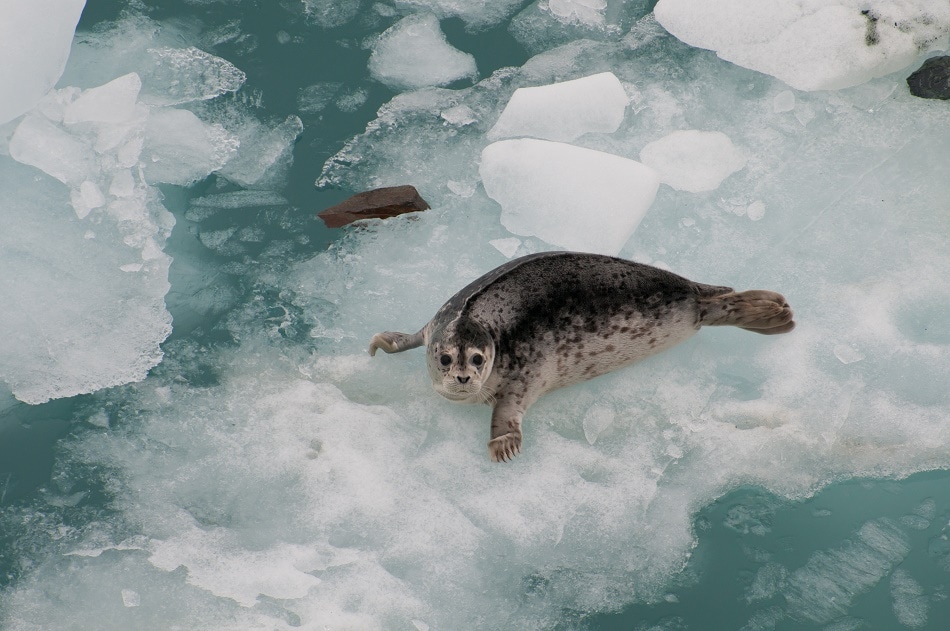
Image Credit: gnohz/Shutterstock.com
The melting Arctic sea ice is currently a cause for real concern as the resulting changes of ocean circulation and other indirect effects related to extreme weather conditions all feed into the narrative of the climate crisis. Now, a deadly virus sweeping through marine mammals such as otters and sea lions could be linked to the increased melting of sea ice caused by climate change, according to a new study published in the journal Nature.
While the melting of sea ice is a natural phenomenon that occurs in the summer, a warmer planet for longer periods of time means that this phase of the sea ice’s life cycle is prolonged. The melting of the sea ice is also important to polar ecosystems as the release of nutrients from the ice into the water acts as a stimulus to phytoplankton – the fundamental base of the marine food chain – which enables them to grow and reproduce more rapidly. Yet, continual and extended periods of sea ice melting have the potential for devastating effects across the planet.
This is due to the fact that the influence of the sea ice on the Earth extends beyond the ocean fringes as the surface of the sea ice reflects the sunlight back into space stabilizing global temperatures which impact the global climate. So, the reduction in sea ice also means an increase in global temperatures and increased likelihood of extreme weather events. Furthermore, this change in climate is now causing the spread of the aforementioned phocine distemper virus (PDV) in marine mammals.
The study which was conducted over a period of 15 years tracked 2,500 marine mammals in various locations via satellite. The researchers discovered that the spikes in occurrences of the deadly PDV virus coincided with the years in which Arctic sea ice melted enough for mammals to move from Atlantic to Pacific regions. The scientists stated that an intense outbreak of PDV in 2003 and 2004 among marine mammals in the northern Pacific correlated to the record ice melt in August 2002 – a period in which over 30% of North Pacific Steller sea lions tested positive for the virus.
Speaking to BBC news, lead author of the paper Dr. Tracey Goldstein said, "The loss of sea ice is leading marine wildlife to seek and forage in new habitats and removing that physical barrier, allowing for new pathways for them to move." This new and increased movement allows for more opportunities for the transmission of, “new infectious disease, with potentially devastating impacts," across species, added Goldstein.
Sea ice has been declining on average 12.8 percent, according to an IPCC report, and the results of this mean that previously impassable ‘sea lanes’ between Atlantic and Pacific regions are now open after thousands of years. What’s more is that the planet has now reached the tipping point where the devastating consequences of climate change can no longer be ignored. This year alone saw a significant melt of the ice in the Arctic region as reports stated that Greenland experienced a melt of 12.5 billion tons of ice in just one day.
With ice also melting in other areas, including Iceland’s mountain glaciers, as a result of human induced climate change, coastal populations and entire ecosystems are now also under significant threat. The IPCC report states, “These sea ice changes in September are likely unprecedented for at least 1,000 years … Arctic sea ice has thinned, concurrent with a transition to younger ice. Between 1979 and 2018, the real proportion of multi-year ice at least five years old has declined by approximately 90%.”
The researchers of this study believe that the spread of pathogens could increase and become more common as ice continues to melt. The scientists also stated that there is also the additional potential for viruses to mutate and affect more species.
Disclaimer: The views expressed here are those of the author expressed in their private capacity and do not necessarily represent the views of AZoM.com Limited T/A AZoNetwork the owner and operator of this website. This disclaimer forms part of the Terms and conditions of use of this website.